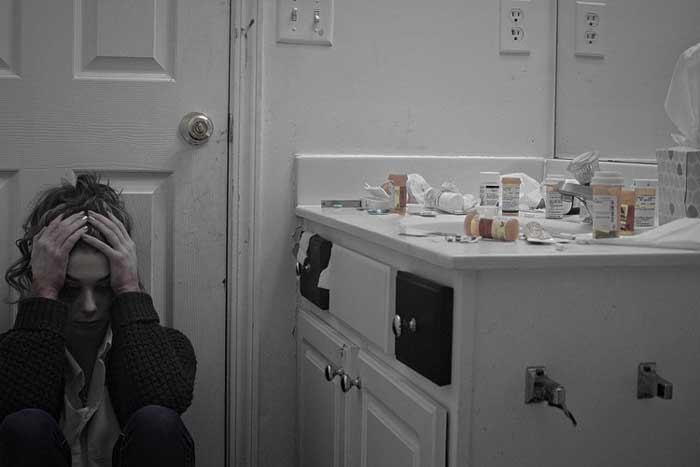When we encounter a stressful situation, it is but human to react to it; but overreaction is a different affair. It can aggravate stress significantly. So your reaction shouldn’t be excessive to avoid insidious complications.

Most commonly, stressful situations cause reactions like sheer anxiety working up to panic, denial, or a desire to find someone to blame. These reactions are ancient, dating back to when all defensive tactics boiled down to flight, fight or freeze.
Since times have changed, these tactics are no longer so helpful – actually, they can only exacerbate stress and do more harm. A modern person should know what kind of reaction is healthy and when inimical overreaction sets in.
Look upon the stressful situation realistically
Is it really as bad as that? Frustrations in the course of a relationship, at work or on the street, are not something unheard-of. Usually, our emotions get the better of us and make us respond, no matter whether the situation at hand qualifies for a strong response or not. It is often enough to ask yourself if it will matter tomorrow to avoid overreaction. You may forget about it several hours afterwards, so is it worth wasting your energy? Or it may be this week’s concern, but definitely not next week’s.
Switch on self-compassion
You want to be more flexible in your emotional reactions – it is self-compassion that can help you develop behavioral flexibility. If you use self-compassion, you can disregard the source of the stress utterly and get busy with your current condition. Feeling self-compassionate, you take the edge off the pressure and can address your abilities to cope with the stress in any way you deem most suitable for the occasion.
Deal with past traumas

An overreaction – especially an irrepressible one – can result from a trauma experienced in the past. As soon as something triggers the memory of a trauma, its psychological results get reflected in reactions to stress, and the person instantly becomes too scared, furious, or overly avoidant.
These aftereffects of trauma may remain unrecognized even though they express themselves under stress. They may be recognized as such only later on when the individual has noticed responses unrelated to stress.
Trauma-generated responses are perfectly logical regarded in relation to the traumatic experience. They are commonly connected with the person’s expectations from dignitaries, bosses, other authoritative figures.
Consider external factors as well
Laboring under stress, we are apt to take everything as a solely personal emotional outburst. Yet your reactions are defined by the situation and its particulars. Taking stock of the details of the situation and collating them with the inner reaction could influence the response and make it more self-compassionate.
Be aware of your strength
As you start to react to stress, the way you cope links with your strong or weak points. The better you understand your strong issues, the better you can fall back on them and involve creative, conscious, and patient traits to overcome the pressure with more grace.
Detect your habitual stress responses
Each of us has a conventional coping technique triggered by a stressful occasion. Most of them, though, were unconsciously worked out back in childhood.
Those who have managed to identify their typical stress responses begin to realize when they are overreacting and can gain control over their response, keeping it within healthy limits. As new reactions manifest themselves more often, they grow to become habitual ones instead of those replaced.
As for typical overreactions, they are listed below for you to see whether they are familiar:
Anxiety can develop into panic. The idea that things may get worse can arise very quickly – especially if you believe the situation is unmanageable. People are apt to shut down or, on the contrary, rush to do something rash.
Wallowing in self-reproaches. Berating yourself for what came about, piling up negative reasoning against yourself.
Distributing blame. Without assuming personal responsibility, look for a scapegoat(s) who can be blamed for everything wrong with yourself as a victim.

Shouldering all the responsibility. Some people cannot but burden themselves with total responsibility for everything, usually quite unrealistically.
Working up a drama. Making mountains out of molehills, exaggerating and insisting on telling everyone around about it in every detail.
Hiding the head in the sand. Sometimes it’s easy to deny something untoward has happened. You are tempted to make the pretense that things will blow over and the coast will be clear the next day.
So, if these scenarios are familiar to you, start regarding them as roles and think about how you would like to change them – or eliminate them altogether, preferring a new one.
The ways to change the undesirable reactions to more healthy ones
To be able to alleviate stress and feel better during a period of crisis, we need to possess a large variety of responses to life’s different situations. First, we should know what options we have when under pressure; then we can figure out which ones will suit our needs better.
Address basic needs
Stress reactions are stressful because they touch a need that one wants to deal with.
Individuals tortured by anxiety and panic would wish to be secure. They become increasingly afraid of worse things to come while their best bet is to dwell on the present state of affairs and decide what steps to make. They will feel calmer and gain what security can be gained currently.
People who blow everything up into a drama crave excitement and attention; they can get it with an unpleasant turn of events, but there are more positive stimulations that would be far less stressful.
The hide-away kind needs reassurance that they are capable of coping with problems. They will do better with creating a positive mindset and dealing with the situation gradually, solving manageable single tasks. There is a technique that could match the basic needs of every person.
Attempt to produce a healthier response

Now that you realize that your stress reaction is nothing but a habit, it can be changed in the way you like. Often the opposite approach does the trick. If you have in mind throwing around accusations – try to accept the situation without blaming anyone and see if you can change it for the good from this viewpoint.
People tending to tackle the issue straightaway can relax and see whether someone else will step in to cope – maybe they don’t even need to do anything at all and could learn a new outlook on life.
If you are inclined to regard the stressful situation as a calamity, try to shift your viewpoint and discover funny sides. Change your response several times to fix the one that suits your purpose best.
The point is that given a magnified awareness of the various responses to pressure, people can figure out the healthiest answer for themselves and do away with overreacting, thereby improving their overall life balance.










